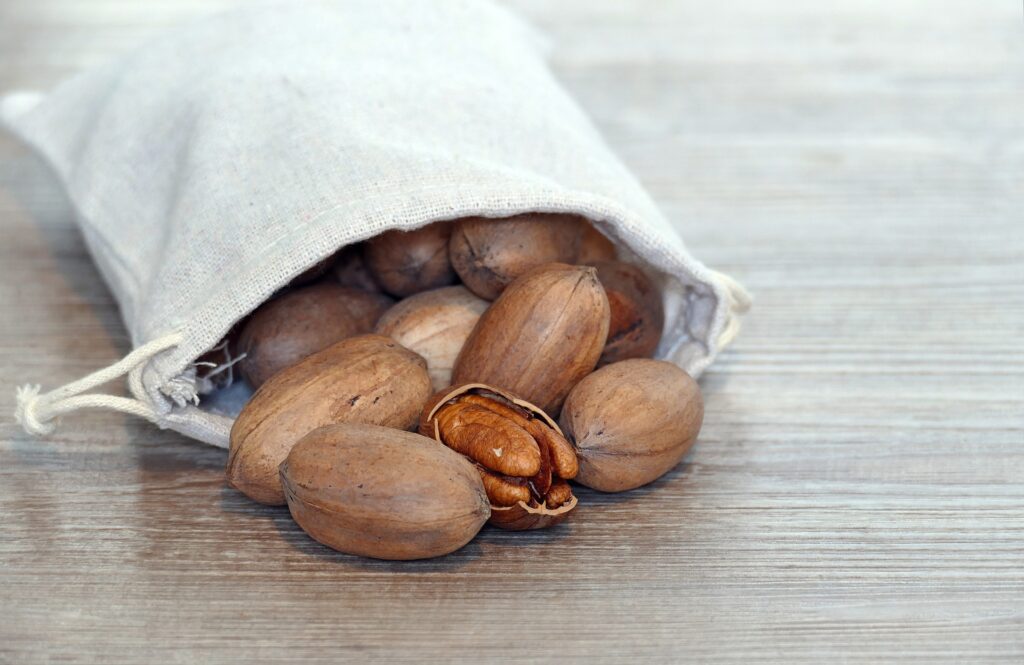This article has been Fact-Checked by Kendall Kennedy MS, RD, RYT
Nuts are often high in calories but that does not necessarily mean unhealthy. Find out whether pecans are good for weight loss or fattening.
Pecans are very high in calories but they do contain great amounts of fiber, vitamins, and minerals and a nice amount of protein.
Additionally, many of the calories in pecans will be from relatively filling fats and you won’t absorb every single calorie.
The result of these things is that pecans are reasonably filling.
That being said, this filling effect will typically not be enough to compensate for the high amount of energy. In turn, it is fair to say that pecans will typically lean more toward being fattening.
You can still implement small amounts of pecans for their nutrients and/or taste and still see weight loss results but you may need to watch your portions and your other lifestyle habits.
In any case, there are also nuts that are better for losing weight than pecans.
Calories in pecans
Something that is often useful when figuring out whether a food like pecans is good for weight loss is looking at the number of calories it contains.
This does not tell you everything you need to know but does still provide information that can be helpful.
100 grams of raw pecans contain around 691 calories (1).
One thing you do want to keep in mind is that the calories in nuts do not get absorbed that well (2, 3). Your body does not absorb a good amount of these calories.
More specifically, some studies find that 5%-20% of the fat from nuts may go through indigested (4, 5, 6, 7).
Even with that in mind, pecans still contain a lot of calories which is generally not good when trying to lose weight. It will be hard to find whole foods that are higher in calories than pecans.
That aside, 56.7 of the calories above come from carbohydrates (14 g per 100 grams of which 9.6 g fiber).
This does make pecans relatively keto-friendly and good for other low-carb weight loss diets.
In short, pecans contain a lot of calories. The sources of these calories still matter but such a high amount if often not great for weight loss.
Micronutrients in pecans
The first thing to look at is the amount of micronutrients in pecans.
Micronutrients are a group of nutrients your body absolutely needs to survive and thrive. Micronutrients include vitamins and minerals. These are involved in basically every aspect of your health, including weight loss.
100 grams of pecans provides you with approximately (1):
- Manganese: 225% of the DV (Daily Value)
- Copper: 60% of the DV
- Thiamin: 44% of the DV
- Magnesium: 30% of the DV
- Zinc: 30% of the DV
- Phosphorus: 28% of the DV
- Iron: 14% of the DV
- Potassium: 12% of the DV
- Vitamin B6: 10% of the DV
And a few others in smaller amounts. These are very good vitamin and mineral contents per 100 grams. If you combine pecans with a healthy diet your micronutrient levels will most likely be great.
Pecans also contain anti-oxidants. These are substances that help your body deal with oxidative stress, damage that occurs from day to day.

Fiber in pecans for weight loss
Another very important factor for weight loss is the amount of fiber in your food.
Pecans contain around 9.6 grams of fiber per 100 grams (1).
This is a big amount compared to most other foods. And for most people this is a good thing.
Fiber has multiple benefits for weight loss. First of all, it feeds your microbiome, the microbes that live in your intestines. The health of your microbiome influences your body’s health and weight. Feeding it well is usually not a bad idea.
Fiber also helps you feel less hungry without adding a lot of calories to your diet. Hunger and cravings can be a big pitfall for people trying to lose weight, so avoiding this is a big plus.
With the amount of fiber in pecans you can reduce the time you spend craving for food a lot.
Protein in pecans for weight loss
Another thing in food that can help you on your weight loss journey is the amount of protein in it.
Pecans contain about 9.2 grams of protein per 100 grams (1). To compare, there are 25.4 grams per 100 grams in salmon (8).
Protein is considered to be the most filling of the 3 macronutrients. Eating enough protein will also help you prevent muscle loss. Muscle helps you burn extra calories throughout the day which is very good for weight loss. Protein calories also take your body more calories to process than calories from carbs and fats.
Although there are a few nuts higher in protein, the amount of protein in pecans is good for a plant-based source of protein. You will most likely also need protein from other foods but pecans can get you started with your daily goals.
Do keep in mind that overdoing it with protein isn’t good either.
Are pecans good for losing weight or fattening?
By now you understand that pecans are very high in calories but that they contain nice amounts of fiber, protein, vitamins, and minerals.
These things in combination with their low carb count make pecans relatively filling. However, likely not to the extent where it can compensate for its high energy content.
In simpler words, pecans will often be fattening because of their high energy content. Even if you don’t absorb every single calorie.
At the same time, it is worth noting that you can still lose weight while eating pecans if you approach your portion sizes and the rest of your lifestyle habits the right way.
It may be worth implementing small amounts of pecans into your weight loss due to their valuable nutrients or because you really like their taste.
Who should not eat pecans
While pecans can be a great addition to the diet for most people, some people are allergic to it.

How many pecans should you eat a day to lose weight?
Nutrition is always a bit of a puzzle in terms of what the perfect diet looks like. It’s a pretty individual thing.
A typical serving of 1 ounce pecans is about 15 pecan halves.
Some people use this 1 oz serving size as a daily recommendation but in reality, it isn’t as simple as that. There is for example no way that a 200-pound man and 140-pound woman should eat the same amount of pecans a day to lose weight.
You need to determine for yourself how many pecans fit in your daily calories. The amount will be different from individual to individual from day to day, it can be 0 too.
Pecan preparation methods you want to avoid
Altough regular pecans can be a great addition to a weight loss diet, many people eat pecans in recipes that hinder weight loss.
Some examples of pecan dishes you generally want to avoid while losing weight are pecan pie, candied pecans, and most other dessert recipes with pecans.

Pecans vs other popular nuts for weight loss
You now know how good pecans are for weight loss but how do they compare to certain other popular nuts? Find out how good pecans are for weight loss vs walnuts, almonds, peanuts, and cashews.
Pecans vs walnuts
First of all, there is the pecans vs walnuts comparison. Walnuts are slightly lower in calories than pecans, 654 calories per 100 grams vs the 691 calories per 100 grams of pecans (9).
Walnuts contain around 6.7 grams of fiber per 100 grams. A relatively big amount lower than the 9.6 grams of fiber per 100 grams in pecans. Walnuts contain about 15.2 grams of protein per 100 grams, pecans 9.2 grams. Pecans and walnuts are similar when it comes to their amounts of vitamins and minerals.
The difference will be very small but walnuts are likely slightly better than pecans for weight loss.
Pecans vs almonds
The next comparison is with almonds. Almonds are lower in calories than pecans, 575 calories per 100 grams vs the 691 calories per 100 grams of pecans (10).
Almonds contain around 12.2 grams of fiber per 100 grams. A good amount higher than the 9.6 grams of fiber per 100 grams in pecans. Almonds contain about 21.2 grams of protein per 100 grams. Almonds have slightly bigger amounts of vitamins and minerals than pecans.
Almonds are very likely better for weight loss than pecans.
Pecans vs peanuts
Peanuts are another popular comparison. Peanuts contain a smaller amount of calories than pecans, 567 calories per 100 grams (11).
Peanuts have less fiber per 100 grams than pecans, 8.5 grams. Peanuts are higher in protein per 100 grams, 25.8 grams vs the 9.2 grams in pecans. Both of these nuts are very high in vitamins and minerals.
Peanuts are likely better than pecans for weight loss.
Pecans vs cashews
Lastly the comparison between pecans and cashews. Cashews are lower in calories, 553 calories per 100 grams (12).
The amount of fiber is a world of difference. Cashews have about 3.3 grams of fiber per 100 grams vs the 9.6 grams of pecans. Cashews contain about 18.2 grams of protein per 100 grams, which is almost double the amount of protein in pecans. In terms of the amount of vitamins and minerals, pecans and cashews are very similar.
The difference in calories combined with the higher amount of protein will make cashews likely better for weight loss than pecans.
Chart of pecans vs other popular nuts
There are some interesting differences in nutritional content that will most likely matter when it comes to weight loss. As you can see, there are quite a few better nuts for weight loss than pecans.
The amount of vitamins and minerals in the foods does matter for weight loss and health but you can’t simplify that in one number. You can check out the numbers for pecans (1), walnuts (9) almonds (10), peanuts (11), and cashews (12), to compare.
| Values Per 100g | Pecans | Walnuts | Almonds | Cashews | Peanuts |
|---|---|---|---|---|---|
| Calories | 691 calories | 654 calories | 575 calories | 567 calories | 553 calories |
| Fiber | 9.6 g | 6.7 g | 12.2 g | 8.5 g | 3.3 g |
| Protein | 9.2 g | 15.2 g | 21.2 g | 25.8 g | 18.2 g |
